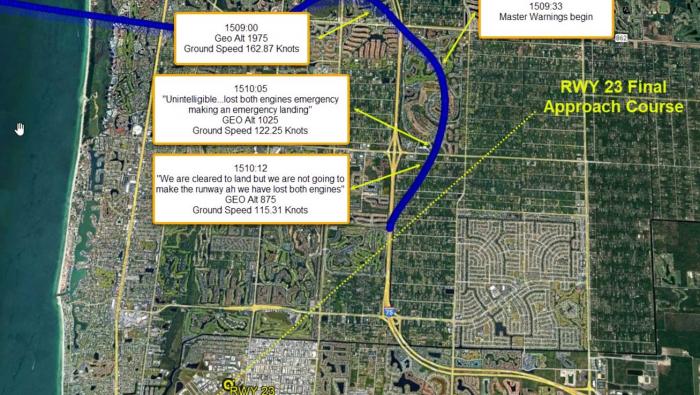|
Eleven were killed in five business jet accidents around the world in the first half of this year, down from 24 killed in seven accidents in the first six months of 2023, according to preliminary information compiled by AIN. Global business turboprop fatal accidents and deaths also declined. Despite fewer accidents (three versus four), the nine fatalities from U.S.-registered business jet accidents in the first half remained unchanged year over year. In the rest of the world, two people died in one non-U.S.-registered business jet accident in the first half versus 15 killed in three accidents in the first six months of 2023. On January 20, two of the six aboard a Russian-registered Dassault Falcon 10 died when the twinjet crashed while in Afghanistan on a chartered ambulance flight. Meanwhile, U.S.-registered business turboprops suffered nearly the same number of fatal accidents in both comparable periods, but the number of fatalities dropped this year. Four Part 91 mishaps claimed seven in the first half of this year versus 17 fatalities from five accidents last year, including five deaths in a Part 135 accident. Nine accidents involving non-U.S.-registered business turboprops killed 36 in the first half of 2024, compared with 28 killed in eight crashes in the like period last year. |
|
|
EBAA has joined Dassault Aviation in taking legal action against the European Commission’s Taxonomy Delegated Act, which it says discriminates against the industry. On July 4, attorneys acting for the industry group told the European Union (EU) General Court that it is intervening with assistance in the case launched by the French aircraft manufacturer earlier this year. The so-called EU Taxonomy is a classification system that identifies approved sustainable economic activities with the intention of helping companies and investors make decisions over sustainable investments and “green” financing. According to EBAA secretary general Holger Krahmer, the European Commission specifically excluded business aviation on ideological grounds in a way that discourages investment in the sector’s efforts to decarbonize. According to Brussels-based EBAA, the exclusion undermines the competitiveness of European business aircraft manufacturers, as well as operators and other companies. It maintained that the move discourages financial institutions from funding the production and acquisition of new, more fuel-efficient aircraft with lower carbon emissions. Dassault Aviation filed its case against the European Commission on February 14 seeking to annul an amendment to the existing Taxonomy Delegated Act that was made on June 27, 2023. EBAA and other industry groups had opposed the amendment, which effectively excluded business aviation from the act’s provisions, but the European Commission pressed ahead after a series of public consultations. |
|
|
Las Vegas could be receiving another general aviation airport, according to the organizers of the proposed Las Vegas Executive Airport. In May, the Clark County Commission unanimously approved construction permits for the new field, which would be located approximately 30 miles west of Harry Reid International Airport (KLAS). And in a statement released to AIN, the FAA said, “After a thorough review, the FAA determined that the proposed Las Vegas Executive Airport would not affect the safety or efficiency of the surrounding airspace.” The agency noted, however, “This does not constitute an approval of the single-runway airport.” Rob Lauer, CEO of airport project developer Las Vegas Spaceport, said the FAA's lack of an objection “is a monumental step forward for the Las Vegas Executive Airport and the broader vision of the Las Vegas Spaceport. This is a major step toward creating a space economy that will lead to thousands of high-paying jobs in our community, our county, and our state.” He said engineering and other technical planning issues would need to be completed ahead of the anticipated groundbreaking in the third quarter. The FAA clarified to AIN that it received a proposal for an airport, not a spaceport that presumably would entail further approvals at a later date. |
|
|
EASA has updated its warning to aircraft operators about the dangers posed by interference to navigation systems caused by spoofing and jamming of signals. On Friday, the European aviation safety agency published the third edition of its safety information bulletin (SIB) on global navigation satellite system outages and alterations leading to communication, navigation, and surveillance degradation, underlining heightened threats in airspace around conflict zones. In a bid to offer more timely information about threats, EASA has also established a dedicated platform to update operators on GNSS system outages and alterations in impacted flight information regions (FIRs). Currently, the FIRs of most immediate concern are in the southern and eastern Mediterranean Sea and the Middle East, around the Black Sea, in parts of Eastern Europe, and the Baltic Sea and Arctic region. Jamming blocks signals used by navigation systems, and spoofing sends false information to the receiver onboard an aircraft. The latest EASA guidance updates an earlier SIB issued in November and includes specific recommendations for regulators, air traffic management and air navigation service providers, and aircraft operators. To guard against jamming, operators are urged to verify their aircraft’s position using means other than a GNSS, report anomalies, train crew, and make non-GNSS procedures available. For spoofing, EASA recommends using non-GNSS navaids, closely monitoring air traffic control frequencies, and reporting irregularities. |
|
|
The British Business & General Aviation Association (BBGA) has responded to the spate of attacks on the industry by environmental protestors with the release of new videos in conjunction with a social media campaign. The group said the "Did You Know" campaign will highlight the industry’s initiatives to achieve more sustainable transportation and create jobs in the UK. The series of 20 videos—which will be posted on platforms including X (formerly Twitter), LinkedIn, TikTok, and YouTube with the hashtag #Bizavenables—was filmed at various locations around the UK. BBGA is asking its member companies to share their own stories about sustainability and job creation in response to last month’s damage to a pair of jets at London Stansted Airport (EGSS). According to data from WingX, business aviation connects 3,150 city pairs in the UK, including 120 metropolitan areas and 124 airports. This compares with just 506 connections, 30 metro areas, and 30 airports served by 16 airlines in Europe. “The perception of private aviation as all champagne and caviar is wrong,” BBGA said. “Many of our aircraft have such small cabins you can’t stand up in them, but they connect city pairs which airlines do not. Around 10% of business jets are air ambulances. We have King Airs and PC-12 turboprops repositioning crew and delivering parts for stricken airlines or cruise lines.” |
|
|
Albinati Aeronautics has announced the addition of a Dassault Falcon 6X to its fleet. The Swiss company claims it is the world’s first Falcon 6X available for air charter. According to Albinati, the widebody business jet completed its inaugural commercial flight on July 1 from Malta International Airport (LMML) to Geneva Airport (LSGG). Previously, after the company took delivery of the aircraft from Dassault's Falcon Jet Center completions facility in Little Rock, Arkansas, it made its first flight using sustainable aviation fuel to return to its base in Geneva. “The introduction of the Falcon 6X into our fleet demonstrates our constant pursuit for excellence and innovation,” said Albinati Aeronautics founder and CEO Stefano Albinati. “This aircraft not only enhances our charter services but also strengthens our position as a major player in the European and international markets.” The Dassault Falcon 6X, which was certified by the FAA and EASA in the second half of last year, has a range of 5,600 nm and can seat up to 14 passengers. Albinati Aeronautics and Jetron also formed a partnership last year to create what they described “a compelling player” in the business aircraft brokerage market. |
|
|
South African-based private aviation and charter company Fireblade Aviation is celebrating its 10th anniversary. Initially set up as the Anglo American flight department several decades ago, the operation was rebranded to Fireblade Aviation in 2014. The company said it offers “a one-stop shop for business and leisure travelers, aircraft owners and operators, and tour operators” at Johannesburg OR Tambo International Airport. “Tourism has been in a transformative space in recent years, with charter services being more accessible not only for business travel but leisure and group leisure travel as well. More individuals are realizing that the cost associated with private aviation is not as prohibitive as one might think,” said Fireblade Aviation managing director Leigh Kretzschmar. “Driving positive change in our industry starts with expanding our ecosystem, and that means prioritizing sustainability, driving inclusivity and diversity, and driving awareness for the possibilities of a career in aviation amongst our youth, particularly young girls,” Kretzschmar added. As part of its anniversary, Fireblade Aviation has also launched the first in a series of foundation-phase children’s aviation books, which it said “aims to ignite enthusiasm for aviation, and expose children to the idea that aviation is for more than just pilots and air hostesses.” |
|
AVIATION SAFETY QUESTION OF THE WEEKWhich of the following statements is correct regarding Airborne Collision Avoidance Systems (ACAS II)?
|
|
|
Vote Now in Business Jet Traveler’s Readers’ Choice Survey AIN sister publication Business Jet Traveler has launched its 14th annual Readers’ Choice survey. The poll solicits private aircraft fliers’ opinions about and experiences with flying privately and asks them to rate charter, jet card, and fractional-share providers, membership clubs, aircraft manufacturers and models, and more. All respondents will receive a prepublication copy of the results, be entered into a drawing for a $500 Amazon gift card (gift cards apply to U.S. survey respondents only), and have a donation made on their behalf to Corporate Angel Network. Take this year's survey or view results of the previous Business Jet Traveler reader surveys. |
|
|
|
|
|
|
AINalerts News Tips/Feedback: News tips may be sent anonymously, but feedback must include name and contact info (we will withhold name on request). We reserve the right to edit correspondence for length, clarity, and grammar. Send feedback or news tips to AINalerts editor Chad Trautvetter. |
|
AINalerts is a publication of AIN Media Group, 214 Franklin Avenue, Midland Park, New Jersey. Copyright 2023. All rights reserved. Reproduction in whole or in part without permission is strictly prohibited. |
















